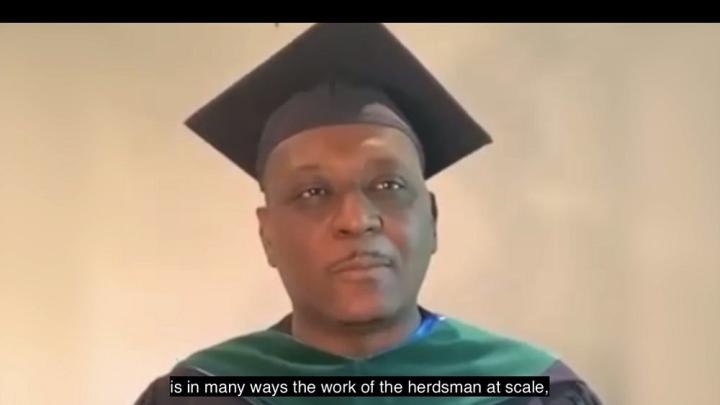Long before starting his current role at the World Bank, which now includes helping coordinate the organization’s response to the coronavirus pandemic, Doctor Muhammad Ali Pate grew up one of 10 children in a family of herdsmen in Nigeria—what “might seem like an unusual background” for a public-health official, he admitted in his graduation speech for the Harvard T.H. Chan School of Public Health (HSPH). Yet, as the bank’s director for health, nutrition, and population said on Thursday, “Those who tend to livestock have a lot to teach us about public health.”
With a lifetime of experience with public-health systems—from leading Nigeria’s Ministry of Health to managing nongovernmental organizations aiming to improve public health in low- and middle-income countries—Pate turned to the practices of herdsmen and -women to give advice to HSPH’s class of 2020 on responding to the current global health crisis. Herders, he said, “must understand the broader terrain within which they work: our relative place in the food chain, the effects of the sun and the water and the land, and how the health of each individual animal depends on an ecosystem.” Above all, “one of the herdsman’s most important tasks is to earn the trust of their flock and their community. With that trust, they must corral everyone in one direction and move them toward a shared goal.”
Leading and caring for the herd, taking into account resource allocation and the interdependent ecosystems that affect every individual’s health, uniting and including the entire community to achieve collective well-being—“Is any of this starting to sound familiar to you?” Pate asked. “This is some of the fundamentals of public-health leadership. And that leadership—your exercising that leadership—has never been more critical.”
Throughout his decades of service, Pate has followed these shared principles of herding and public-health leadership to great effect. As Nigeria’s minister of state for health, he deployed more than $1 billion in U.S. aid to strengthen the country’s primary healthcare system and increase access to vaccines and essential care for women and children, preventing tens of thousands of deaths annually. His efforts as chair of the Presidential Task Force on Polio Eradication nearly eliminated the disease in Nigeria. He’s advised the World Bank on public health and disease control in Africa, East Asia, and the Pacific.
Today, Pate is helping the world confront the unprecedented challenges posed by the coronavirus, a battle that he told HSPH graduates they have the skills and vision to win. “There’s a lot of uncertainty as you prepare to embark [upon] or continue your careers,” he said. “There’s fear of the unknown that lies ahead. But one thing is clear: As the prospective leaders of this field, you have the potential to help the world find our way out of this pandemic. You will help us chart a path towards a healthier, more prosperous, and equitable world.”
His confidence in HSPH graduates echoed the earlier remarks of HSPH dean of Michelle Williams, who in her remarks emphasized how the coronavirus has altered the visibility and role of public health (read about some of the school’s faculty members here), as well as the key role the students will play in combatting the pandemic.
“By now, most of you have heard me say that public health is everywhere and nowhere,” Williams said. “What I mean is that the work we do is critical—and yet so often invisible outside of our own field.” In the United States, many take for granted having access to clean water, stable food-supply chains, and safe commutes on public transportation—until those systems are disrupted: a contamination crisis, empty grocery store shelves, a pandemic. “Well, no longer,” Williams continued. “Today, public health is everywhere. It’s on the top of mind for nearly every person in nearly every country around the globe.”
With their field a visible and essential priority, the class of 2020 is posed to lead the response to the coronavirus. And as Williams emphasized, they have already begun to do so: helping mine data and innovate new strategies to flatten the infection curve, joining a volunteer task force to help the Massachusetts Department of Health, and even risking their lives as first responders.
“Your class will be remembered for generations to come,” Williams said. “You’ll be the public-health graduates who lived through the worst public-health crisis for the past hundred years. And you will be recognized as the class who used that experience to innovate and to develop solutions to the most pressing challenges we face.”
Williams concluded by envisioning how posterity will remember this cohort of public-health leaders; Pate concluded by gleaning a lesson from the past. “Throughout history, in the face of crisis, it has been great leaders who paved the path for humanity to triumph,” he said. “Leaders who acted within—and, yes, outside their purview—to do what is right, often at great risk to themselves.” These leaders acted selflessly and with integrity, were committed to science, built consensus and coalitions, and, above all, held themselves and others accountable—the very skills herders use to tend livestock.
“The work of the public-health leader is, in many ways, the work of the herdsman at scale,” Pate said. “With keen observation, using scientific tools, galvanizing people from a range of backgrounds and perspectives towards a common goal—to not just overcome a crisis, but to make progress towards preventing the next one. That is exactly what the Harvard Chan School has prepared you to do. And that is how you will shepherd us toward a safer, healthier world.”









